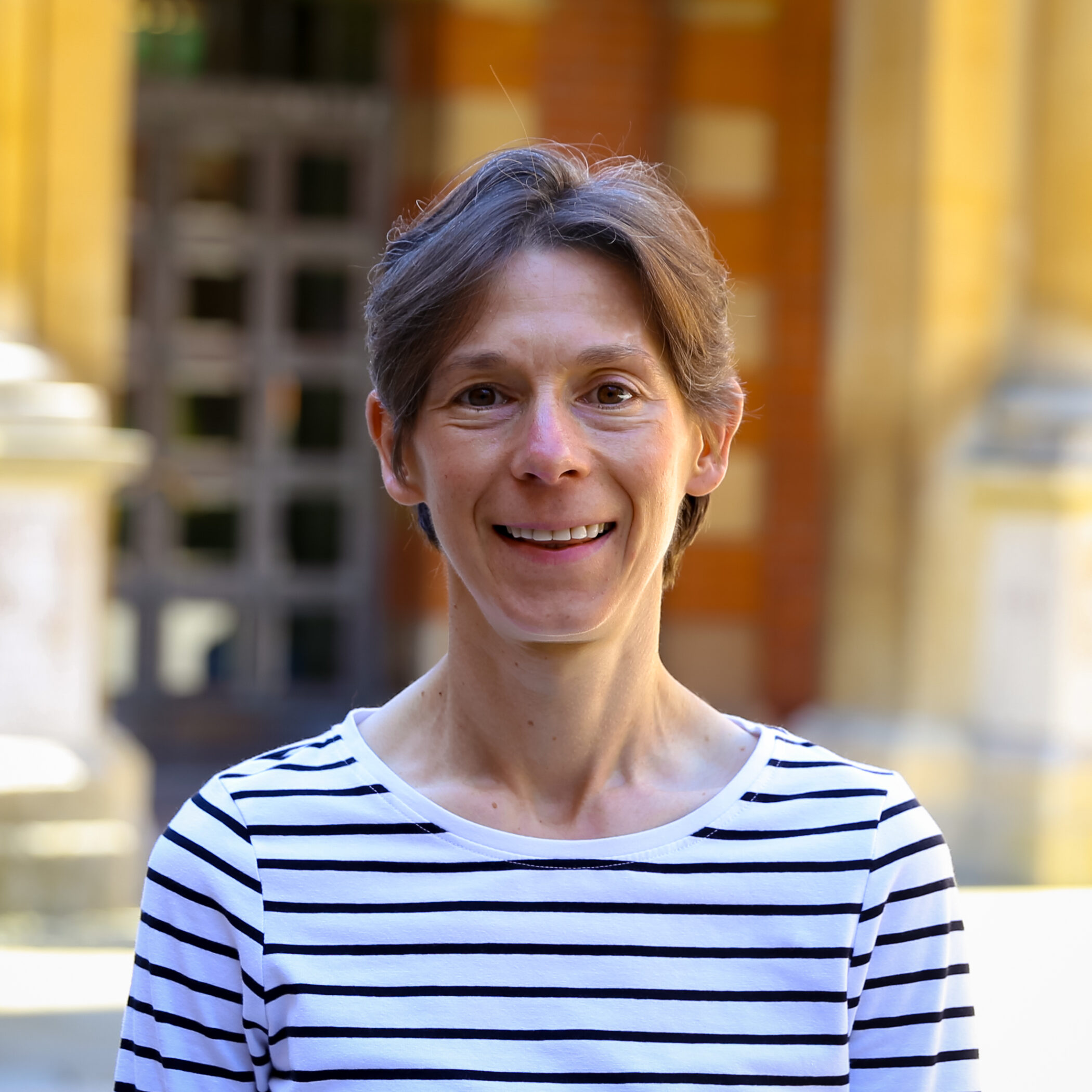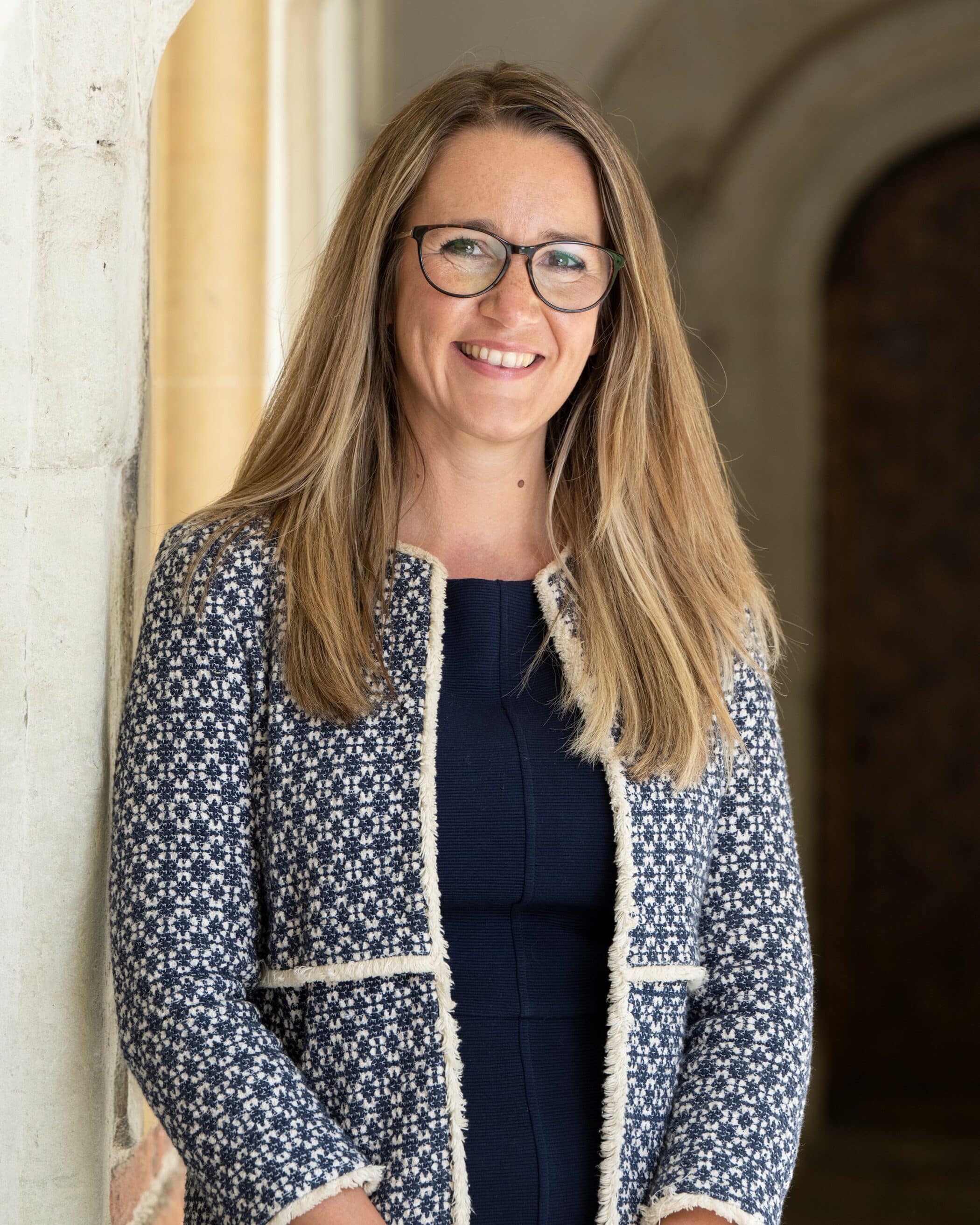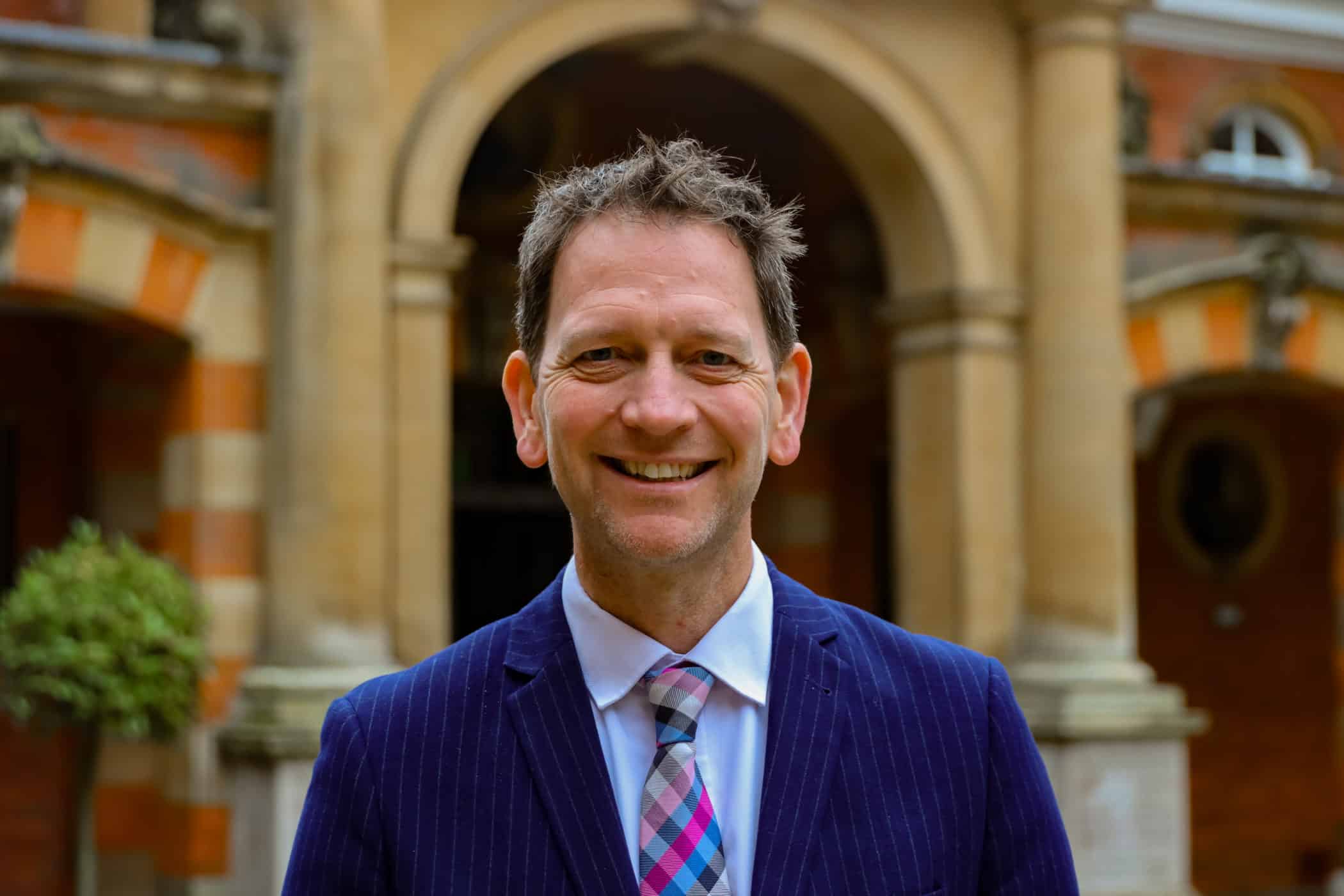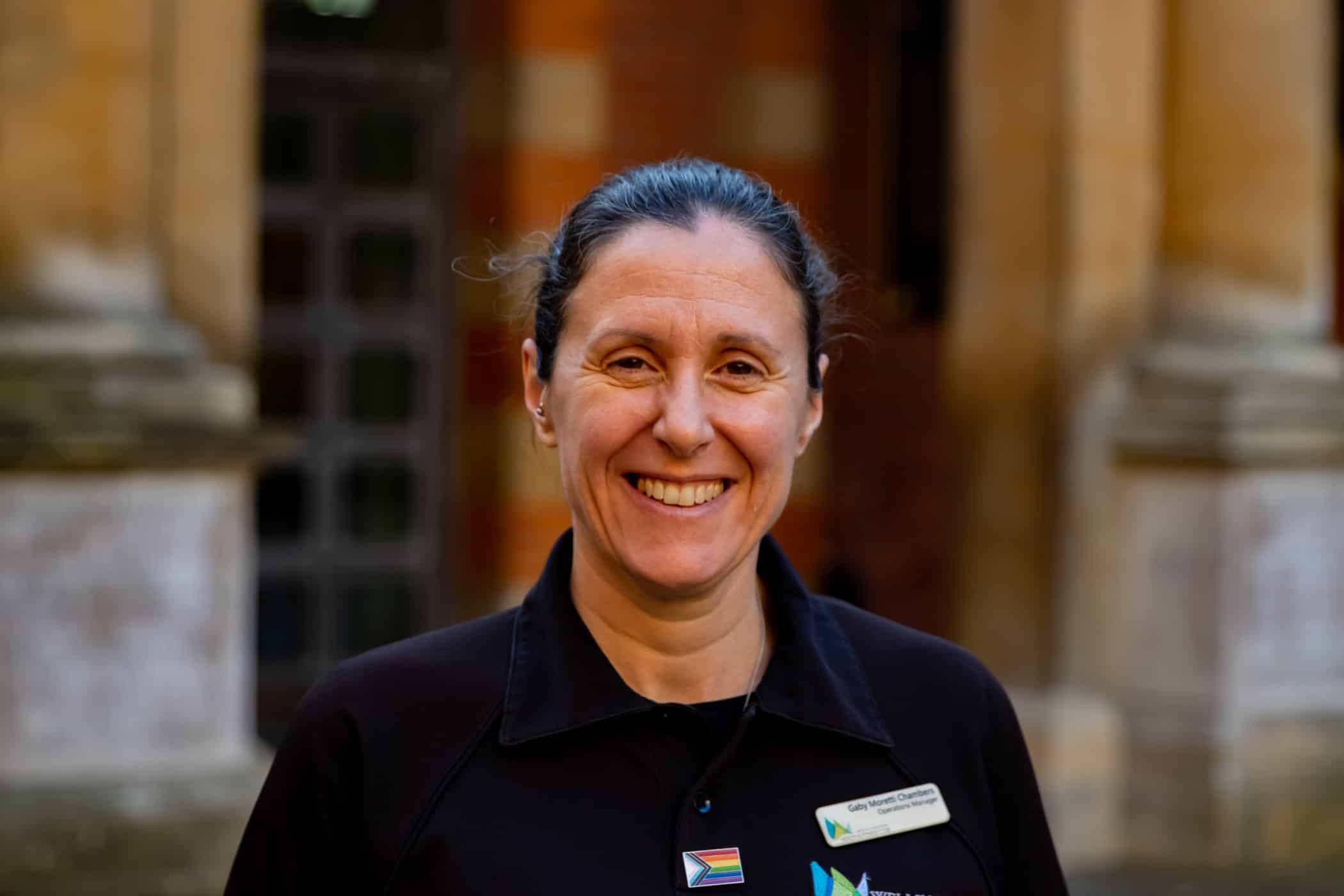The Safeguarding Team
| Contact details |
|---|
| Delyth Lynch (DSL) 07825 419190 |
| Stephanie Eyers (Deputy DSL) 07469 858984 |
| Tom Wayman (Deputy DSL) 07766 448086 |
| Gaby Moretti Chambers (Deputy DSL) 01344 444243 |
If you are concerned for a child’s welfare, health or safety or if you have concerns about the behaviour of any adult – parent, member of staff or member of the general public – please contact the Designated Safeguarding Lead or a Deputy immediately.
Lent Term 2024
A note from the Director of Safeguarding
The Lent term is always an interesting one – it’s the jam in the sandwich, the thin layer of time when exam years really start to focus on what’s ahead, the Third Form grow in confidence and thankfully it starts getting lighter and warmer. It is, however, the time that the pastoral and safeguarding teams are at their busiest for a variety of different reasons: anxiety increases as public examinations loom ever closer, our Upper Sixth face life changing decisions – university and gap years, and the combination of dark nights and the boarding environment blend together in various different recipes which can mean students – and staff – leading with their emotional mind, rather than their wise mind. I have spent the first few weeks of this term going into year group assemblies and speaking about the results of the annual ‘Feeling Safe’ survey. Parents were sent a link to the podcast where the safeguarding team discussed the main highlights from the survey and I did just want to draw your attention to them in this newsletter as well (see ‘What’s going on at Wellington’). I spoke to the students about their ‘wise mind’: young people are often driven by their emotional mind which can lead to them not stopping and thinking about a consequence of a particular decision and whether their action is in line with the College values. We have also used the weekly staff email to emphasise this to staff too. Good relationships are built on a foundation of trust and openness and staff not only need to role model wise decision making to each other, but – more importantly – to the students.
Life in the Lynch household was thrown into a degree of chaos when we welcomed Fudge in mid-January. I thought I had said goodbye to night time waking, crying and the mopping up of bodily fluids… as you will see below, Fudge is going to join Coco as the new school therapy dog and she starts her training with Canine Assisted Learning after half term. She has already drawn in the masses through the Rainbow door, and the staff are now getting used to students coming to see Fudge… rather than us…
I do hope that you are able to find some useful information in the newsletter and, as always, please do feed back about any issues or topics that you would like to see featured in the future.
Stay safe,

Introducing… COCO and FUDGE
Ok – who is going first? Fudge? Yes, you can as I know you have a very short attention span.

I was born in Virginia Water on November 17th 2023. I am one of 7 siblings and my mum is a Cavachon and my dad is a toy poodle. I moved to Wellington on the 13th January and although I missed my old family to start with, I love being here. I especially like the woods and going for walks without the very loud cars driving around me.
Do you enjoy being a therapy dog?
I haven’t started my formal training yet, but as part of my early socialisation I have been in the Rainbow team offices getting used to lots of faces and loving all of the cuddles I get from everyone. I love the bean bags in my office; if I jump on them I often can’t get out… I start my proper training after half term and am very excited. I can already sit, lie down and am walking quite well on the lead. I will do anything provided I get some chicken…
What is your biggest challenge in this role?
I think I might be quite busy and I must make sure that I get enough rest and sleep so that I can always be relaxed and refreshed. I am looking forward to working with young people who might be sad or having a difficult time. I know that I will be able to cheer them up and respond to them with unconditional love.
Tell us something no one knows about you…
I am very good at pretending. In the garden I react to my name and bound towards my owners. Sometimes, when we are out, I simply pretend that I have forgotten that and don’t bother coming back… (Sshhh – don’t tell anyone).
OK – Coco, over to you!
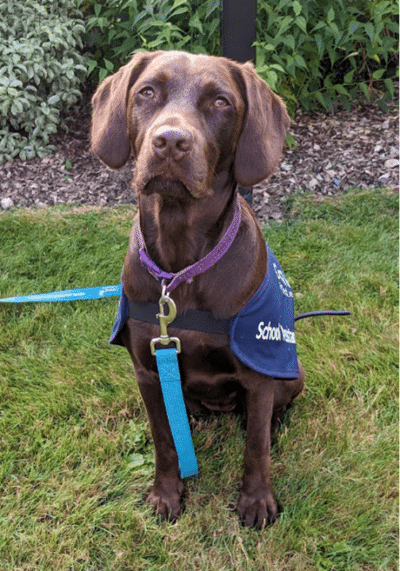
I was born in Wales but when I was 8 weeks old I went to live with the Kirkhams. I missed my mum and my brothers and sisters at first, but I soon settled in with my new family and I loved all the attention they gave me. I started training as a therapy dog straight away – my new human ‘mum’ made it really fun and gave me lots of tasty treats while I was learning, so I really enjoyed it and was always keen to practise. I started to come into school when I was about 6 months old and I loved it straight away. I met so many people and I made lots of doggy friends too – my best dog friend is Peggy who lives in the Hopetoun – we have so much fun running around together in the woods.
Do you enjoy being a therapy dog?
I absolutely love being a therapy dog. I love putting on my jacket and coming in to school every day because I get to meet lots of people who like to play with me and give me cuddles. I’m never bored, and I love showing off my clever tricks because I earn lots of treats and help to make people smile. I can sense when people are feeling sad, and I love to cheer them up by giving them my paw to hold or letting them give me a cuddle. People seem to find it much easier to talk about problems while sitting with me and stroking my soft coat helps my visitors to feel less anxious and stressed. My mum always makes sure that I’m ok too – I get to go for lots of walks around campus and I have a lovely comfy bed in MFL 3 where I can have a little snooze if I get tired.
What is your biggest challenge in this role?
My biggest challenge is not being able to solve everyone’s problems, but I do, at least, help them to feel a bit better, even if only for a little while. I also find it quite hard not to chase squirrels and pigeons when I’m working, but I do get a treat for resisting the temptation.
Tell us something that no one knows about you…
I once stole a three-layered chocolate cake from the dining room table. I told my family that I was very sorry, but I didn’t really mean it – the cake was delicious.
In the spotlight – Supporting and listening to your children by Steph Eyers
Getting a child or young person to talk to you about something that they CLEARLY do not want to talk to you about can feel like the most frustrating and hardest task we come across as parents and professionals working with young people. However, we learnt from our recent Staying Safe survey that our students are more likely to talk to you, as parents about issues in school than they are us as adults working with them. This is why it is imperative that you, as parents, feel equipped to encourage your children to talk to you about their issues and know how to manage them within our school context. In the article below, we look at some of the ways in which you can help foster a relationship with your child where they come to you with the ‘big stuff’ such as bullying and abuse, as well as the smaller things that can impact their everyday wellbeing.
The strategies that encourage children to open up will often differ depending on their age and stage of development as well as their personal preferences. However, one common theme that we find with many of the children and young people we work with across Eagle House and Wellington is that they will often feel more at ease to talk when they are doing something else. Examples of this could be, colouring in, walking the dog, playing sport or anything that your child likes to do.
Younger children may express their worries through play. Observing their play to look out for signs of distress or immersing yourself in their imaginary world can be helpful tools in understanding what is going on for your child. You might find that they are mimicking exchanges they have had with their friends throughout the day, they might even be modelling those behaviours they have seen with their siblings. In those situations, it is important to remain curious in your response rather that chastising or criticising the behaviour. Trying to understand the why is important when we think about whether you need to raise the concerns with the school.
As children get older and move into the prep school age group, the way that they communicate will change and develop. In this age group you might find that are more willing to tell you what their perception of what is happening is. A word of caution here, perception and reality at this age and stage of development can be poles apart. It is important to accept your child’s perception and validate their feelings, whilst also being open to the fact that it might not match the reality you are observing.
By the time young people come to us at Wellington, you may see another change in communication style. Your lovely, bubbly, communicative child may have become a sullen teenager overnight. Sometimes the instinct can be to let them get on with it and emerge as a fully eloquent 20 year old, however that is less than ideal! Coming alongside you child is really important here and putting in the work to understand their world is key. Take time to understand what their friendships are like, what music they listen to, what apps they use, find out what (or who) they love. You can do this by approaching conversations in an open, curious and non-judgemental way. Teenagers are especially aware of the way in which we as adults react to certain circumstances. When your teen brings you a problem, be that big or small try to be mindful of your reactions. If they perceive you have overreacted to a situation, they are less likely to tell if something else happens, which can leave them in a vulnerable place.
For all ages making sure that you maintain that open, trusting relationship with your children is the cornerstone of ensuring that they come to you when something happens to them.
If at any point you become worried about your child, or another child it is important that you remember that you are not alone. Wellington and Eagle House have pastoral staff that can support you and your child in whatever you need. If you are not sure if you are worried or not, the Safeguarding Teams at either School would be happy to talk to you on a ‘no names basis’.
Further information advice and support can be found below:
Talking to your teenager – NHS (www.nhs.uk)
Talking to your child about feelings – NHS (www.nhs.uk)
Problems at school | How To Deal With Problems At School – YoungMinds
Youth Vaping by Rebecca Mills, Eagle House DDSL & Year 1 teacher
I recently attended a safeguarding course with local Bracknell primary and secondary schools. I was shocked (and perhaps naive) to hear many schools reporting that children as young as 9 in their settings were known to vape. Figures from NHS England show there were 15 cases where children aged nine or under needed to be admitted to hospital because of vaping in 2023, this was up from 12 in 2022 and two the year before that.
The DfE state that the number of children using vapes has tripled in the last three years and there is strong evidence to suggest that cheap and easy-to-use disposable vapes are partly to blame. Children’s awareness of promotion of vapes has also grown, particularly in shops where more than half of all children report seeing e-cigarettes being promoted, and online where nearly a third report e-cigarette promotion on sites like TikTok and YouTube. We know it is illegal to sell vapes to under-18s and the boxes are clearly labelled. But, it’s easy to see why certain products would appeal to children.
Thankfully, in January 2024 the government announced some positive action against children vaping. The sale and supply of disposable vapes is being banned in England, Scotland and Wales because of their appeal to young people. Alongside this, to make vapes less attractive to children, they are strengthening the regulation of vape flavours, packaging and how they are displayed in shops. There will also be an ‘on the spot’ fine of up to £100 when they spot the sale of tobacco and vapes to children in England and Wales. The ban is being introduced after a public consultation on smoking and vaping showed nearly 70 percent of respondents including parents, teachers, healthcare professionals were in favour of the measure.
Although this is very positive news there is no finite date on when this will be in place and the government have said there will need to be a buffer period for retailers to adjust.
As parents and as educational professionals we all need to be aware of the dangers and exposures that our young people may have had or will have to vaping in the future. With the appointment of a new Head of LFL (our PSHE programme) at Eagle House, we will be reviewing our curriculum and ensuring that these current issues are addressed in an age-appropriate programme which covers EYFS through to Year 8.
What’s going on? An insight into the world of safeguarding at Eagle House and Wellington
Eagle House
Filtering & Monitoring systems: This term has seen a concerted effort to address various aspects of online safety and to promote healthy digital habits amongst our pupils.
Early on this term the Online Safety Team met along with Tony Whelton (Director of IT services and development at Wellington) and Andrew Milne (Senior IT infrastructure engineer at Wellington) in order to discuss and assess the effectiveness the school’s filtering and monitoring systems. This is a key aspect of safeguarding our young people at Eagle House and we were able to identify key areas for enhancement, emphasising proactive measures to mitigate online risks whilst the pupils are in our care.
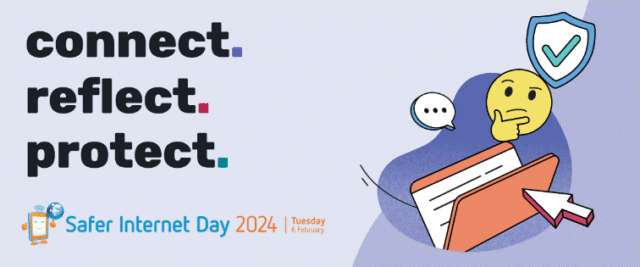
LFL Digital Matters sessions: Jess also delivered an LFL session to our Year 5 & 6 pupils around the issue of healthy online relationships using Digital Matters material. Parents are encouraged to use this free platform which allows your child to explore their understanding of how to use the internet safely while still having fun. To access the platform click here and select ‘Begin as a parent.’ You’ll then be able to see the range of topics along with resources for you to help support your child’s learning.
BSA Safeguarding Audit: Rounding off the term, Eagle House underwent a safeguarding audit conducted by the Boarding Schools’ Association (BSA). Claire Dan (Director of Safeguarding and SACPA) spent a day getting under the skin of Eagle House – touring the school and meeting with groups of children from EYFS-Year 7 and groups of staff. She has provided valuable insights into the school’s safeguarding practices, highlighting areas of excellence and identifying opportunities for further enhancement which we will action over the coming months.
Eagle House Feeling Safe Survey results (Dee Guest): We asked all Eagle House students to complete a Feeling Safe survey in November 2023. Children from year 3 to year 8 complete the survey independently with their tutors who are on hand to answer any questions and children from nursery to year 2 complete the survey with their Pastoral Year Heads (Jane White and Claire Rhodes). Where the Eagle House survey differs from the College is that it is not anonymous – this gives us the opportunity to be able to talk to the children about any concerns that have been raised. We are working hard to ensure that not only do the children feel heard but we want them to see that we are wanting to act on their concerns and for them to see the changes.
Highlights from Eagle House survey were:
- All EYFS children felt safe at school and were able to name several people that they trusted to talk to if they were worried. They all felt that there were people at school who noticed if they did something well.
- All year 1 and 2 children agreed that there were people in school who cared for them and could name someone they could talk to if they were worried.
- The children in year 3 and 4 were able to identify an amazing range of activities and lessons across a wide spectrum where they felt happy and fulfilled at school. The children were all very open in their responses and their tutors were able to have meaningful conversations with them about how they can be supported in school – these coaching style conversations are such a valuable teaching opportunity, and we are starting to help the children understand that asking for help is always beneficial and a lifelong skill.
- 91% of the Upper school children felt that if they felt unsafe or unhappy they had someone they could talk to. This is a big improvement on last year when only 84% of children felt the same way. Any child who felt that they were being bullied or that someone was being unkind to them has been spoken to by their tutor and an action plan put in place. There were several children who displayed courage by raising their peers as someone that they were concerned about and felt they needed support.
Our action plan includes the following points:
- Addressing feelings amongst senior pupils that girls are treated differently to boys, this has been highlighted to teachers.
- Helping children understand how they are recognised in different ways for their achievements
- Improving site security – many children gave excellent ideas on how they felt we could help them feel safer, these have all been considered and have either been implemented or form part of our action plan
- Improving supervision in both change rooms and during playtimes ensuring that duty staff are visible and able to manage situations as they arise
- Tackling the ‘snitch’ idea that the children have about telling adults about unkindness – this is a culture shift and building trust between children and adults is key.
As Ed Venables has highlighted, we are working hard with teachers and children to build relationships, it is through relationships and a culture of trust that we can ensure that all children at Eagle House feel safe and able to flourish!
Wellington College
The ‘Staying Safe survey results’: In October, students completed that annual ‘staying safe’ survey. This is a completely anonymous survey undertaken by the safeguarding team is carried out in order to take a deep dive into many aspects of College life but especially around whether they feel safe, what they would do if in a certain situation as well as analyse any trends and patterns, particularly around child-on-child abuse. We always listen and respond to the results; this is not a tick box exercise but done to inform the safeguarding annual development plan and also see where we can improve the student experience. The key highlights were:
- A progressive upward trend of students feeling able to report any incident (involving a member of staff or a student) to a member of staff
- Passive by-standing continues to decrease (those who are most likely to ignore an incident f unkindness were 4th and 5th form boys)
- Students are more likely to confide in a parent if there has been an incident involving a member of staff, but more likely to speak to a member of staff or friend if an incident has involved another student
- House staff – especially HMs – are the most likely staff that students turn to for help and support
- Feeling intimidated by larger groups of students (both boys and girls) was highlighted as something which made pupils feel more unsafe and the dining hall was also stressed as a source of anxiety, particularly the younger years
An action plan has been written and several pieces of work are already in progress; our works team have improved (and continue to improve) campus lighting in the areas that students highlighted as a concern and there is a working party looking at the dining hall space and safety along the Kilometre. Recognising that you – our parents – are often the main source of support to your young people, Steph has written a piece on building those positive and open relationships with your children. These are just a few of the many action points that we will look to work on over the coming months. More information can be found in the podcast (link given above) and some of the key statistics are listed below:
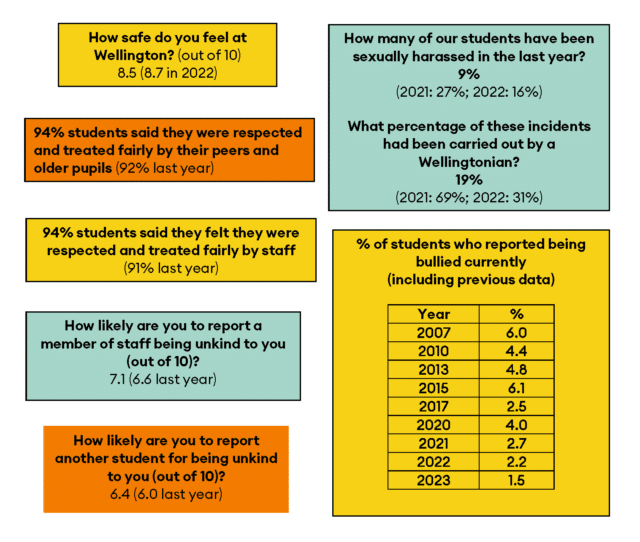
Safer Internet Day: Safer Internet Day (6th February) was also recognised at Wellington. Several students spoke to the whole school about what the day meant and how they could make a difference. As part of Safer Internet Day, the NSPCC launched this very helpful resource page for parents about how you can go about talking to your children about all online matters – Keeping Children Safe Online.
Parental Online Safety Group: The group met for the first time at the start of the Lent Term. Although disappointing that more interest was not shown from the parental body, the small number of parents who did meet discussed a variety of issues and it was exceptionally helpful to get feedback about experiences and provision. One parent mentioned how useful Qustodio was with regards monitoring and controlling social media use on mobile devices. This is something all parents should be aware of and this site offers some useful advice about all of the parental control apps that are available in 2024.
Mental Health: The Lower Sixth mental health ambassadors have had a busy term. The week beginning 5th February was children’s mental health awareness week and the ambassadors spoke to raise awareness of this in whole school assembly, and, with the theme of “My Voice Matters”, organised karaoke evenings in houses. Two of the ambassador chairs spoke with the communications team to help raise awareness in the wider community – ‘Your Voice Matters’ this Children’s Mental Health Week – Wellington College. In addition, some of the ambassadors met with the parent mental health committee to talk about their role, and all ambassadors have continued running events in their houses to help the mental health and wellbeing of students.
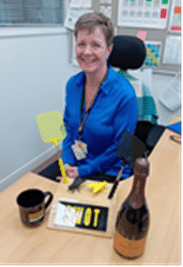 Safeguarding Winner of the Term (Michaelmas 2023): We were delighted to award Emma Chatterton with the SWOT in December. Emma joined the safeguarding team to help with the training admin and did a remarkable job in transferring all of the training data to the SCR tracker system in order to make the process more efficient. Sadly Emma has recently left the team in order to concentrate on a different project, but she will have left an important legacy. Dee Varcoe now takes over this important role.
Safeguarding Winner of the Term (Michaelmas 2023): We were delighted to award Emma Chatterton with the SWOT in December. Emma joined the safeguarding team to help with the training admin and did a remarkable job in transferring all of the training data to the SCR tracker system in order to make the process more efficient. Sadly Emma has recently left the team in order to concentrate on a different project, but she will have left an important legacy. Dee Varcoe now takes over this important role.
New policies and updates: One of the main Government Guidance documents, “Working Together to Safeguard children” was updated in December. Although it did not directly impact any policy changes in the College, all references to the guidance needed to be updated. The DfE is currently consulting on the draft guidance for ‘Gender Questioning Children’. The consultation is here. The College has had a Transgender Policy in place for several years now; in light of the draft guidance Naima Charlier has been amending the policy alongside the Safeguarding team and Katherine Baker (Director of Legal and Compliance). It is likely that the guidance will come into force on the 1st September 2024.
The transfer of safeguarding information to new schools is becoming ever more complex and it is important that we get this right – passing on relevant information to help a student in a new setting but also being mindful that we need to think about GDPR and not share – inadvertently – any information about another pupil as part of those records. We therefore have a new ‘Transfer of Information’ policy to ensure that we get this right. Another internal safeguarding protocol that we have put into place this term is a ‘Referral Checklist’. There are some issues that we are duty-bound to report to external authorities and, again, it is important that we get this right, making the correct level of referral and to the relevant area of Children’s Social Care. Our new checklist will ensure that we are correct in our referral process and are supporting the young person involved and parents whilst also fulfilling our duty of care and statutory responsibilities.
Departmental Visits: The team have a cyclical programme of visits to various departments in the College. This year we are focussing on the ‘non-teaching’ side of the College. These departments (ranging from Admissions to Finance and Administration to Cleaning – and all of those in between) completed an audit prior to the meetings which looked at the culture in their teams and their current level of safeguarding engagement. Steph and Delyth have really enjoyed the visits – they have been insightful and informative and we hope to be able to support this incredibly important area of College life more in the future. Our non-teaching staff are not only the beating heart of the school but they are also our ‘safeguarding eyes and ears’ – all need to have a high sense of awareness with regards their responsibility in this area and it is a real privilege to work alongside so many gifted and committed people.
Cyber Security training: At the start of term, Tony Whelton (Director of IT) and Delyth delivered training to staff on this important area. Whilst also highlighting to staff how important their own actions are (defending against phishing attempts, using strong passwords, securing devices), Tony also cited the sorts of threats that are posed to Wellington’s IT network on a daily basis and how he and his team ensure that we are protected. Chesley Cole (online safety committee and teacher of IT) has also delivered two excellent talks this term to the Middle School on the same topic.
Safeguarding email themes: All staff receive a weekly email which takes a deep dive into a particular area of safeguarding. Over the last few months, subject areas which have been covered include:
- Safeguarding adults
- Child Criminal Exploitation
- Communications and record keeping
- ‘What happens next?’ – after a disclosure or a referral
- Banter versus bullying in sport
- Confidentiality – what does this mean in safeguarding?
Wellington College and Eagle House – joint work
Courses: Continued professional learning is an area which is taken very seriously at Wellington. Not only do our safeguarding team have ongoing training in a variety of different areas (for example Steph Eyers is currently completing her SACPA Advanced Certificate in Safeguarding Practice, and Delyth is completing her NSPCC Accredited trainers assessment), but all staff complete both statutory and recommended safeguarding training over the year as well. We try and make these as relevant to Wellington as possible and in March, Delyth delivers VBA (Values, Behaviours and Attitudes) interview training to our international schools. This term, a new strand of EDI questions are also being trialled as part of the process. An accredited Lucy Faithfull Safer Recruitment trainer, she also delivers the first bespoke course to Eagle House and Wellington staff next term.
Transition work: The transition between schools can often be fraught with anxiety for both young people and parents. We were delighted that the extensive work that Wellington has put into this area was recognised when the Safeguarding team were awarded the ‘SACPA outstanding initiative award’ for their work in this area. The team are looking to work closely with Eagle House on this area over the next few months and also extend the work to new 6th Form students as well.
Annual Audit: Always keen to improve and ensure that we are meeting the needs of our whole community, Wellington College and Eagle House will start their annual external safeguarding audit in the second half of the Lent Term. This year, we have chosen the safeguarding arm of the Boarding School’s Association to undertake this piece of work. Several staff from the BSA will be forensically analysing our policies and procedures, but also spending periods of time in school to ensure that they can feel the culture and look at the interactions between staff and students. As part of these visits, the students will be invited to see the auditors at various times: student voice is incredibly important. The audit is not about passing with flying colours or giving ourselves a pat on the back for all we do. It is designed to find holes and areas for improvement so that we can continue to strive for excellence in all we do.
What’s going on in safeguarding in the UK? A closer look at CTE
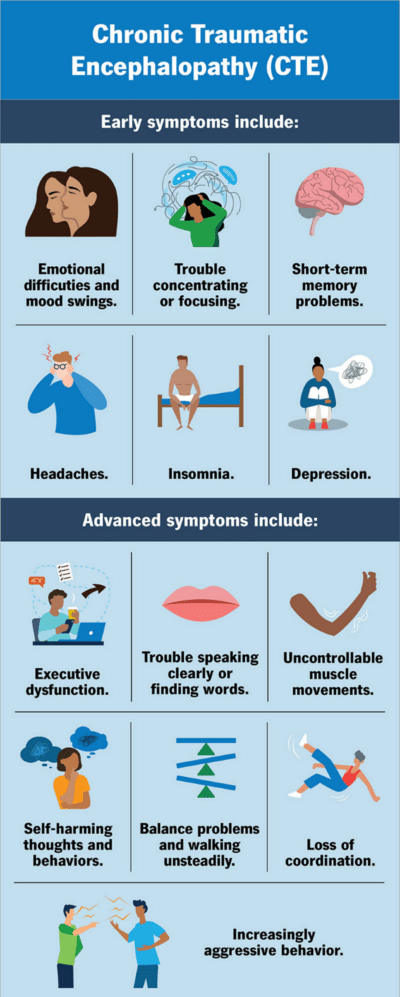
A recent paper (you can read it here) written by Jack Hardwicke has questioned whether it is right for children to participate in sports that intentionally feature impact, arguing that allowing under-18s to participate in high impact sports should be viewed as a form of child brain abuse. As you can imagine there are many sides to the debate; opponents of prohibiting children from playing high-impact sports argue that boys are naturally aggressive and heavy contact sport helps them to learn how to control their feelings. The NSPCC has said that physical neglect is a form of abuse that occurs if a child is not kept safe and allowing children to participate in sports whilst being unaware of the harm they can cause is “a failure to keep children safe.”
Wellington has a strong rugby tradition; many of the students who play (both boys and girls) love it and continue to play when they have left the School. It will be interesting to see how this debate continues as the Government Ministers are asked to privilege children’s brains over corporate sporting bodies.
You can watch a heated debate on Lunchtime Live at the beginning of February on this issue here.
‘Concussion – is rugby safe for kids?’ a Newsround report can be viewed here.
E-guarding – A guide for parents
Karl Hopwood podcast – the safeguarding team were lucky enough to be joined by Karl Hopwood at the end of last term. We looked into the current trends and patterns surrounding online safety and why it is incredibly hard to engage parents with this topic. You can listen to the podcast here.
Safer Internet Day resources – Childnet released this resource: ‘A conversation guide to talking about online issues with my child’ here. You can also read the research report which provided the basis for the Safer Internet Day theme here.
Cyber Choices programme – led by the National Crime Agency. The Cyber Choices programme is offering a series of webinars to parents with children aged 7 – 18 years old in order to help parents and guardians to understand: what computer misuse is, what the risks to young people are, to recognise some of the indicators that young people may be involved in committing cybercrimes, and how the Cyber Choices programme supports at-risk individuals. The registration links are below:
Talking to girls – Parents are urged not to delay speaking to girls about online safety. You can read more here.
AI and children – The Children’s Commissioner for England has published a blog post on the use of artificial intelligence (AI) in the UK and the impact on children. The Commissioner raises concerns around potential risks that AI poses for child protection such as: cyberbullying and sexual harassment; generative child sexual abuse material; and impacts on children’s learning. Read the blog here.
Internet Watch Foundation TALK checklist – research done by the Internet Watch Foundation, shows that 1 in every 4 teens has received unwanted sexual messages online. Awareness of how to mitigate this issue is vital to securing the young people of tomorrow, and to help in that endeavour the Internet Watch Foundation has created a resource pack. You can access the resource here.
OfCom- How video-sharing platforms protect children from encountering harmful videos. This report looks at how social media platforms are protecting children from accessing potentially harmful videos.
Better Internet for Kids – this is an excellent resource page for parents and teachers. There are deep dives into topics such as sexting, online gaming and algorithms.
Teenagers and social media – how teenagers navigate the nuances of social media and what adults can learn from them. Read the article here.

Instagram and other social media checklists – Privacy is optional on Instagram, and there is a wide spectrum of privacy options. To understand these options better the Southwest Grid for Learning has published resources aimed at achieving this goal. Please click on the link to find out more.
What is doxing? A guide for parents. Find it here.
JOIN THE DEBATE… The Guardian is interested to hear views from UK parents about boys’ attitudes towards girls and what they believe is shaping them. You can share your experience here.

Read more about Wellington’s safeguarding team winning the Safeguarding Initiative Award for a second year running here.
Michaelmas Term 2023
A note from the Director of Safeguarding
A warm welcome to those who are reading this newsletter for the first time. If you are a new parent to Eagle House or Wellington College, I do hope that your first half term with us has been a good one. Unbelievably, I found myself starting my 25th year in teaching in September, and my 13th as Designated Safeguarding Lead (DSL); over this time safeguarding has changed immeasurably. Back in 2010 safeguarding training consisted of informing staff about the four main areas of concern: neglect and physical, sexual and emotional abuse. Individuals were just not as familiar with exploitation, radicalisation or mental health issues and the infrastructure to support young people simply did not exist. Over a decade later and we see schools and safeguarding leads being much more highly trained to identify risks to children and a much higher active level of vigilance across all staff, with the emphasis being on “safeguarding being everyone’s business” and recognising that even if issues are not being reported, we should all maintain the view that they are still happening.
In September, a new area of responsibility (through KCSIE 2023) was added to the DSL’s portfolio – that of ensuring that the DfE’s Filtering and Monitoring standards are being met. Cue a crash course for this DSL in an area of online safety and that has traditionally been seen as the domain of the ‘IT department’. Both schools have long had robust and effective filtering and monitoring systems in place, however, we also need to ensure that our provision is being reviewed annually, that our filtering system blocks harmful and inappropriate content without impacting teaching and learning and that roles have been specifically assigned to individuals within the organisation to manage the systems. I have really enjoyed getting to grips with this new area over the first half of term and particularly bringing together the Safeguarding and IT departments to ensure that we are working together and that we all understand what each other’s needs are. Jess Goves and myself have been working through detailed audit forms which will form the basis of our whole school online risk assessment documents and, as with all things safeguarding, although it has felt a bit like a labour of love at times, it certainly means that the schools are in a better place as a result.
As parents, you are the DSLs in your homes and so my question to you all is what do you understand about this area of online safety and what filtering and monitoring systems have you set up at home? Do you have parental controls which can be activated at any time, or have you taken the route of assuming that ‘everything is ok’ and ‘this isn’t something we need to be worried about?’ There is an excellent UK Safer Internet guide here if you feel this might be an area you would like to understand more fully.
I speak frequently about safeguarding being the golden thread that runs through everything we do in a school; it needs to be embedded in every activity and at every level and part of the school community. You – our parents – are a crucial part of this ‘safeguarding family’. You will see and hear information which might concern you or that simply ‘niggles’ you. Please help us to build jigsaw puzzles and never worry about passing information to us that you think we ought to know. The short story about ‘Everybody, Somebody, Anybody and Nobody’ can be aptly to applied to safeguarding……
This is a story about four parents named Everybody, Somebody, Anybody and Nobody. There was some important safeguarding information being discussed over a WhatsApp year group chat and Everybody was sure that Somebody would tell the School. Anybody could have done it, but Nobody did it. Somebody got angry about that because it was Everybody’s job. Everybody thought that Anybody could do it, but Nobody realised that Everybody wouldn’t pass on the information. Everybody blamed Somebody when Nobody did what Anybody could have done and it ended up that the School didn’t know anything about it, and a young person didn’t get the help and support that they needed and were entitled to.
Stay safe,
Delyth
Introducing… Steph Eyers
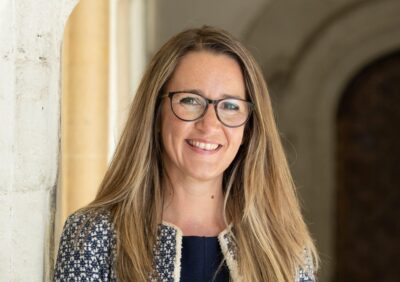
Steph is our new Safeguarding Manager. Whilst she is based up at the College, she is working across both schools. Steph joined the group at the end of August.
Steph, tell us your story!
What feels like a million years ago, I started my career as a nanny for a family with three children. As they grew, rather than work for another family I started a job as a Family Support Worker in Children’s Centres and that is when I started to become more involved in safeguarding. Fast forward a few years and I took a role in a Primary school in Bracknell and spent the next 8 years working as a Designated Safeguarding Lead (DSL) and Family Support Advisor in schools. Most recently I have been working purely as a safeguarding lead in an independent secondary school and have been privileged to join the Safeguarding Team at Wellington College and Eagle House in August.
At home, I live with my husband, our two boys and our much loved cat, Bear.
Can you tell us a bit about what the role of Safeguarding Manager entails?
The role of Safeguarding Manger is so varied that it is quite hard to detail in a paragraph. When I talk to the students I say simply say, ‘my role solely exists to keep you safe, be that physical or mental safety’. In reality, I do that by being a part of the pastoral leadership team, acting as a point of contact for students, staff and parents for all thing safeguarding (this could be anything from ‘I received a nude’ to image to, ‘I am worried about my child’s wellbeing’ to ‘there’s members of the public where they are not supposed to be’). I also manage some of the safeguarding administration processes, such as ensuring all new staff have a safeguarding induction, monitoring internet filtering and monitoring, and support Delyth Lynch in her role as Director of Safeguarding and Jess Goves in her role of Deputy Head – Safeguarding.
What do you think your biggest challenge will be and how will you aim to overcome it?
Mastering the Wellingtonian and Eagle House language! Every school I have worked in has slightly different terms or acronyms they use for quite usual parts of school life (Grubbies is a good example of this!) I am pleased to say that having been here half a term, I am getting there (and have only turned up at the wrong place once!) Also… directions, I always carry a map.
What do you enjoy doing when you are not working?
I genuinely enjoy baking, I am no Mary Berry and you will not see me on Bake Off any time soon, but I do like the process, and spending time with my family.
Tell us one thing that no one at Wellington or Eagle House will knows about you.
I started a degree in Architecture before changing directions and the only thing I can remember from it is the difference between Corinthian, Ionic and Doric columns!
In the spotlight – The online context
TEENAGE FOCUS – by Steph Eyers
When we talk about safeguarding in schools, we will often talk about ‘contextual safeguarding’ and what we mean by that is understanding the needs of a student in terms of their specific place and space in society. This is quite a simple concept when with think of student in terms of their place within their family, community and friendship groups or the spaces they occupy, their homes, school, friend’s houses. It becomes more complex when we think about young people in the context of the online spaces they occupy.
As an adult population, who are responsible for the safety and wellbeing of these young people in these spaces, it is imperative that we take time to understand how and why they are using these spaces in the way they do. This, however, is no small task. As adults we may use the same apps or visit the same websites, but we will use them in different ways and therefore the algorithms that fill our feeds with content will be different to those of our students or children and therefore our experiences will not be the same.
We can also apply this to relationships and behaviour online. Many young people with have friends in the online space that we as parents may not have ever met, the young person may not have met that person ‘in real life’ either. This may feel like a completely alien concept to many of us, however it is the reality that our young people are living, and it does not mean that those relationships are any less valuable or less complex than those in the real world.
But how can we support our children to navigate this online world I hear you ask! Thankfully, many of the skills you already have as parents will be helpful here too. The single most important thing you can do is maintain an open and non-judgemental approach to talking about the online world with your children. This could mean being curious about what they are doing, asking them to teach you about the new app they are using, demonstrating that sometimes you get it wrong online too and when they do something that is less than ideal online be there to support them, not judge or criticise. If you feel uncertain about something, let them know and find out the answers together. The online context can seem overwhelming, however it also offers some amazing opportunities when explored in a safe and measured way and it is important to remember that for our young people.
If you would like any advice or support about the online context or anything else safeguarding related, please do contact a member of the safeguarding team, we would be delighted to support you or your child.
EYFS FOCUS – Written by Jane White (EYFS practitioner and DDSL)
What children in the Early Years are doing online
Children in the early years are extremely digitally savvy. Their use of digital devices is commonplace, with Apps like YouTube Kids becoming an App of choice for 72% of children aged 3 to 4 according to a recent Ofcom report.
Research has found that children are watching less TV and opting for video-on-demand content on video-sharing platforms to watch cartoons, short movies, nursery rhymes, and songs. However, unlike older children, only a small number of children aged 3 to 4 (23%) play online games.
The effect of device use on children’s development in the Early Years
Screen use can have benefits for children in the early years but brings challenges. Growing research has found that there are both positive and negative developmental outcomes.
Benefits of screen use include:
- opportunities to promote creativity and learning
- language development
- improvement of numeracy and literacy skills
- broader understanding of their world
- development of digital skills
Challenges of screen use include:
- ramifications on children’s ability to control their emotions
- displacement of activities that promote social interactions vital for development
- risk of exposure to inappropriate content
Screen time for children in the Early Years
In the UK, the Royal College of Paediatrics and Child Health published guidance for parents and clinicians, suggesting ‘there are no ‘safe’ amounts of screen time.’ They state that the ‘right amount of screen use will vary between families.’
This outlook highlights the need to assess screen time limits based on the needs of each individual child whilst making certain sleep and social activities are not impacted negatively.
It is important to accept that the quality of what children “consume” will have the most impact. For example, encouraging children to watch or engage with content that helps them learn about the environment or using apps designed to help children stay active, are just some of the ways that screen time can help children thrive on and offline.
Therefore, the content and context of screen time becomes central to children getting the most out of their online use and it not becoming detrimental.
Advice for using screens safely
As devices become more commonplace, here are some tips on how to help children use screens safely.
Things you can do to support children’s use of technology include:
- using device safety settings to ensure apps and content are age-appropriate
- monitoring and supporting children while they use devices
You should teach children about internet safety by:
- making them aware of what safe use of technology looks like
- choosing educational apps and platforms that help them to develop their skills
- having conversations about staying safe online
Stay informed about issues that young children face online through keeping up to date with news and research on internet safety.
What’s going on? An insight into the world of safeguarding at Wellington and Eagle House
Eagle House
This term has seen the establishment of a safeguarding team at Eagle House. We meet fortnightly to discuss any safeguarding concerns and trends which need addressing as well as discussing proactive steps we should be taking as a school to ensure our children are safe. It has been wonderful having Delyth Lynch and Steph Eyers join us for these meetings as it enables us to collaborate, learn from each other and share best practice across the two schools.
In the first few weeks of term Jess spoke to all children in both Years 1-4 and Years 5-8 assemblies about staying safe, how we keep them safe at school and who they can turn to when they are worried about themselves or others. One of the priorities this year is to ensure that all children have a trusted adult in the school community that they know they can speak to and be heard when they are worried, upset or have a concern.
The safeguarding team have conducted safeguarding learning walks across the site to speak to staff and pupils about safeguarding and to pick up on and address any safeguarding concerns in that specific area of the school.
Jess has spent the first half of term working with HR to ensure that all our consultants (those who provide activities, sports coaching and music lessons to our children) have had the correct employment checks and DBS checks. You will be pleased to hear that all these checks are complete. Parents will notice that these consultants now all wear an EH lanyard and photo ID badge.
Wellington College

We were delighted to receive confirmation that following reaccreditation, Wellington was re-awarded the Carnegie Centre of Excellence for Mental Health in Schools ‘School Mental Health Award’ – Gold Status. Across the 8 competencies, Wellington was assessed as ‘Excelling’ and the report highlighted Jenny Griggs’s superb leadership in this area as well as stating how much progress has been made in the area of student voice, provision and support for students and staff wellbeing.
What have the Values Champions been up to?
The Values Champions are now being led by Steph Eyers and were delighted to be joined by two new members this term – Tommy Morris (Security) and Nas Basra (Maths and Assistant HM of the Talbot). The last two months have been particularly busy as there have been a lot of new members of staff starting at the College, all of whom receive an induction about the values when they begin.

You will all be aware that currently there are several building projects at the College. Any such project brings with it various safeguarding risks, not least having extra contractors on site. Louise is the College ‘Major Projects Manager’ and has been brilliant at ensuring that every contractor who comes on site has the relevant safeguarding paperwork checks and also alerting the safeguarding team to any issues. Louise also completes a large number of safeguarding risk assessments to ensure that everyone in our community remains safe – and safeguarded. Thank you Louise!
New VBA interviewers trained
At the beginning of October, 9 new VBA interviewers were trained. VBA interviews are an integral and important part of our recruitment process and it assesses whether the candidates values, behaviours and attitudes are in line with those of the College. Delyth was joined by co-trainers Ian Davis and Gaby Moretti-Chambers and over the two day training course the participants learned about the origins of the interview, its importance in the overall safeguarding culture within the College and a lot of interview practice! We are now lucky enough to have 59 trained interviewers within the College. Future plans include introducing this across our international schools as well as Eagle House.
New policies and updates
The start of a new year always heralds the arrival of policy updates and new policies. I would like to draw your attention to the rewritten Child-on-Child abuse policy (which incorporates anti-bullying) and also to the fact that three extra policies have now been included on the College website: Selection and Recruitment, Sexual Violence and Harassment and Online Safety. We have also tightened up our guidance around staff driving students in their own cars and now have a new policy which outlines the various expectations and guidance around this area.
Finally, we have been working on an information sharing document which clearly outlines what safeguarding information we transfer to a student’s new school. KCSIE 2023 requires all schools to transfer information within 5 days of a student having transferred. To make this process more efficient, we have devised a checklist and more efficient mechanism of doing this in the future.
New academic year training
A school population is highly transient which poses obvious challenges with regards safeguarding. September is an enormously busy time for the team, heading to all year group assemblies to highlight our roles, how we can help and how students can contact us. A lot of very specific training is also undertaken by the students; for example all of those involved in external Global Citizenship programmes which might require a degree of safeguarding knowledge, training the House Mental Health Ambassadors and speaking to students who mentor pupils in our International Schools. Just after half term, we also delivered a series of talks to all year groups detailing a little more about what the safeguarding team do to dispel any myths. We did this via some case studies and scenarios which highlighted what might happen if they spoke to us about an incident or something which may have happened to them. Steph and Delyth are hoping to raise parental awareness about our role in a recorded podcast just before Christmas – watch this space…..
Keeping track of safeguarding training across all of the staff and volunteers at Wellington College is no mean feat. We were therefore delighted to join Emma Chatterton to the team in September. Emma now maintains the database of training and ensures that everyone’s training is up to date and the relevant paperwork and requirements have been completed.
Visit by the TES and speaking to the DfE
We welcomed two senior staff from the Times Educational Supplement – Dawn Jotham and Lauren Ainscough – earlier this term who were keen to speak to us about safeguarding e-learning and what worked for both teaching staff and DSLs. They really wanted to know how our knowledge of safeguarding could inform how they wrote and delivered their online courses to teachers across the world. The visit was highly informative and the team learnt a lot.
Delyth was also invited to speak to Cynthia Davies, the new Designated Safeguarding, Strategy and Learning Lead from the DfE Schools Group. New in post, Cynthia wanted to gain more knowledge about the ever-increasing demands on DSLs in schools. Delyth was able to represent the thoughts of DSLs across the Bracknell Forest Local Authority.
Wellington College and Eagle House – joint work
Governor Oversight
The Board of Governors now oversees both Eagle House and Wellington College. In October the Safeguarding and Pastoral Sub-Committee met to discuss several items including supervision and site security as well as the new safeguarding staffing structure across both of the schools. The Full Board also met in October. This meeting has an important safeguarding focus; it is the time that the full safeguarding report for the previous academic year is presented to the Governors and time is given to the Board to challenge the systems and structures in place. This year, they also received training in Filtering and Monitoring and Low Level concerns, with particular emphasis on how this aspect is a core tenet of safeguarding culture as a whole within an organisation.
Training all staff and volunteers
Safeguarding Leads throughout the UK spend a lot of time in September updating their staff and volunteers. Most notably this is updating everyone about the new Keeping Children Safe in Education (KCSIE) statutory guidance. The whole team has been involved in this process and also ensuring that all staff and volunteers have read and understood Part 1 of KCSIE. This year we linked the reading and quiz to the reading of the Acceptable Use of ICT policy, which was very successful.
Supervision

This year we are working with Talking Heads Supervision as our external supervision provider. We now have 13 Senior leaders across the two schools being supervised and we are excited about introducing supervision at Eagle House this term. Delyth Lynch, Tom Wayman and Sarah Mackenzie (HM Combermere) will be providing supervision for the Pastoral Year Heads and Safeguarding team.
What’s going on in safeguarding in the UK? What is Mandatory Reporting?
In October 2022, the final report of the Independent Inquiry in to Child Sexual Abuse was published. The report recommended that the UK and Welsh Governments introduce legislation placing certain individuals – ‘mandated reporters’ – under a statutory duty to report child sexual abuse in prescribed circumstances. The report also recommended that that it should be a criminal offence for mandated reporters to not report child sexual abuse when a child or perpetrator discloses it to them, or if they witness a child being sexually abused.
This area is particularly relevant to those of us working as staff or volunteers in schools because a mandated reporter would be:
- Any person working in regulated activity (this would include roles such as scout leaders and youth workers)
- Any person working in a position of trust (teachers, doctors, social workers, sports coaches, faith leaders)
Most people agree that mandatory reporting is essential and long overdue, with proponents arguing that it would offer greater protection to children. However, not as simple are the finer details for compliance and non-compliance and fears that it could create a ‘needle in the haystack’ effect and result in a tick box approach to child protection.
In May, the Government published a call for evidence on the proposed duty which was part of an extensive consultation to ensure that everyone’s views are represented ahead of implementing the new duty. Safeguarding leads across the country were given the opportunity to comment on a variety of different aspects as well as major organisations such as the Boarding Schools’ Association and the Independent Schools Council. This call for evidence closed in August.
In November, the Government launched a consultation to set out proposals for creating a mandatory reporting duty. The consultation closes on the 30th November and a paper summarising the responses will be published within 12 weeks.
What’s been on which is linked to safeguarding?
Each week, the safeguarding team sends out an email to staff which highlights a particular area of safeguarding including some questions to answer or scenarios to think about. There is also a ‘watch, listen and read’ section. In the last newsletter, the team received many positive comments about the inclusion of this section. I am also adding some recent podcasts which have been included in the newsletter as well. Both can be good ways of engaging your children in a certain topic.
| Theme | Programme / Podcast |
| Incels, cyber-stalking and rough sex | Laura Whitmore investigates, trilogy of programmes here. |
| Online safety podcast | ‘Interface’ – the online safety podcast by SWGfL. This episode focusses on the importance of listening to the voices of young people. Listen here. |
| Children in care | The August documentary presented by Joe Swash explored the issue of teenagers in care. Watch here. |
| Eating disorders | Zara McDermott explores the reasons behind the record number of young people who are being treated for eating disorders. Watch here.The ‘Weigh Up’ is a series of podcast by Molly Smith, a recovering anorexia sufferer. You can listen here. |
| Boys and men in society | Richard Reeves speaks to Nicky Campbell about his new book which explores the male malaise. Listen here. |
| Cybersecurity | File on 4 – Held to Ransom – Listen here. |
| Sexual assault | Gaia: A death on Dancing Ledge. Watch here. |
| Domestic abuse | SafeLives shines a spotlight on the impact that domestic abuse can have on young people. Watch here. |
| Dealing with Autism | Footballer Pat Nevin discusses life as a parent to an autistic child. Listen here. |
If you have seen or listened to something which you would like to share with the safeguarding team, please do email Jess Goves.
E-guarding – A guide for parents
This term Eagle House is introducing an Online Safety team in order to ensure that our online safety education provision for pupils, staff and parents is the best it can be.
Parents – If you are interested in online safety and have any ideas about what parents would like to know in this area then please contact Jess Goves with your ideas.
Online Safety guidance – there is so much out there for parents about online safety, and so we have collated this useful set of resources for you. We hope you find them useful.
Common Sense Media – set up with the aim to ‘build a digital world where kids can thrive’, this site provides really interesting information for parents based on research. It is the US’s leading nonprofit organisation dedicated to improving the lives of children by providing trustworthy information around all areas of the media. Including articles on ‘how to talk to your teen about sexting’ through to advice on what you can do if your child has seen pornography accidentally online, it is well worth a look here.
National Online Safety Platform for parents – as we know, the online world is posing an ever-increasing risk to children and it is important that schools, parents and carers work together to take an active role in educating young people about online dangers. We all need to know how children can act safely when online: it is an incredibly important part of safeguarding our children. We have been working with National Online Safety for the past year in order to provide resources to you all. To create your account, please follow https://nationalonlinesafety.com/enrol/wellington-college and complete your details. When you’re set up, you’ll be able to set ‘Parent/Carer’ as your user type.
‘What you do you need to know?’ guides
The top three social media sites for young people are Snapchat, Instagram and TikTok. What do you know about them? Here are three very helpful guides for parents:
Social media and primary aged children – read about Cardiff University’s research here.
ParentZone – has a wide variety of different resources and their Tech Shock podcast is also highly informative. Their website is here. You can also read about this year’s ‘Be Internet Legends Day’ which takes place on the 28th November.
UK Chief Medical Officers’ advice for parents and carers on screen and social media use – originally published in 2019, this is a useful reminder for everyone!







